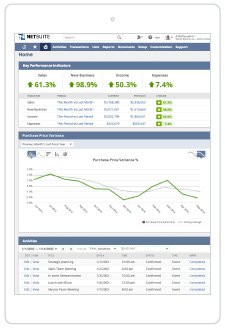Controller
Get your numbers right the first time—and every time
Understand The Business Transaction
Optimize Your Finance Organization By Switching From Efficiency to Effectiveness
The role of the controller is changing in ways that mirror those of the broader finance function. The increased involvement in strategic support is raising the financial controller’s profile introducing concerns around how finance areas will support demand to meet a wider set of expectations. This is in addition to an already complex finance function fuelled by changing regulations, budget and resource constraints and plans for corporate expansion.
NetSuite delivers improved business results while optimizing financial processes. NetSuite offers the functionality your organization needs to improve efficiencies, reduce costs and get more done by eliminating time-consuming, error-prone manual processes and point solutions by automating and streamlining day-to-day accounting and financial operations.

Benefits
Controller the Custodian
Focus on governance, ensure compliance and controls are in place, and stay compliant with tax and regulatory changes across the world with automatic upgrades and built-in capabilities.
Controller the Bookkeeper
Focus on accounting operations, from transaction processing through financial close and reporting. Streamline and automate day-to-day accounting and financial operations eliminating slow, error-prone manual processes.
Controller the Business Partner
Organize so that you can operate at a strategic level by enabling self-service; spend more time working through and advising on the financial and control implications of delivering the strategy.
Controller the Commentator
Tell the business story in numbers using variance analysis, KPI’s, custom reports using real-time data and information that helps management make better decisions.
Features
Improve Financial Reporting
A single version of the truth across the entire organization offers unprecedented efficiency and accuracy for meeting audit and reporting requirements.
Enhanced Financial Close
Accelerate financial close by up to 50 percent and improve revenue recognition processes.
Optimize Financial Processes
Transform inefficient manual and paper-based processes into streamlined workflows with end-to-end support for order-to-cash and procure-to-pay processes.
Support Multinational, Multi-Subsidiary and Multi-Currency Operations
Global businesses manage multiple subsidiaries with NetSuite’s built-in support for 190+ currencies, 19 languages and tax reporting in 50+ countries.
































